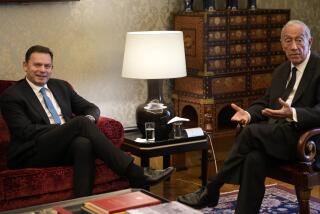Market Focus : Portugal’s Government Says Goodby to Business : Europe’s poorest country wants less state interference in the private section. The early result: fast growth and new hope for the future.
- Share via
LISBON — From a riverside colonial palace in old Lisbon, Jose Elias da Costa has one of most singular government jobs in the emerging new Europe.
“I sell companies,” he said.
Portugal, the poorest but fastest-growing country in the European Community, is waving good riddance to its socialist past.
Da Costa, a secretary of state in the Finance Ministry, implements a new, counterpoint philosophy. “We think that less state is more state. We want a more open market with less state interference in the economy. It is an idea to achieve a political purpose in the interests of the people,” he said.
The goal is to make the Portuguese economy more modern, more efficient and more competitive in the coming Europe without frontiers.
With broad national support, the government of Prime Minister Anibal Cavaco Silva is systematically divesting itself of companies expropriated after the 1974 Portuguese revolution replaced decades of right-wing dictatorship with leftist ebullience.
Critically, constitutional change last spring allowing the government to dispose of the majority interests of expropriated companies is supported not only by Cavaco Silva’s center-right Social Democratic Party, but also by the center-left Socialist Party, long headed by former prime minister, now officially independent President Mario Soares.
The narrowing differences between the two parties, which claim about 80% of the electorate in a nation of 10 million, are now more of specific applications than of general philosophy. Both see the private sector as the engine for necessary, rapid economic modernization.
With some of Europe’s last hard-line Communists struggling to keep their party’s support in double digits, foreign investors and Portuguese entrepreneurs are taking advantage of a stable political environment whose democratic future seems assured by Portugal’s membership in the European Community. The Social Democrats, in power since 1986, are not running a candidate against Soares in presidential elections early next year, and parliamentary elections later in 1991 should raise no fur, even if Cavaco Silva’s party loses power.
“The political passions are over. I think it is now obvious to everyone that they were a mistake,” said Mario Mosqueira do Amaral, president of the Espirito Santo Finance Co., who, as an officer of a nationalized bank, had to flee revolutionary Portugal to avoid arrest. At socialism’s peak, according to Da Costa, the state’s share of the economy had grown to more than 50%, including hundreds of small companies acquired as part of the nationalization of big banks that controlled them.
Thus far, the Cavaco Silva government has sold off a bank, an insurance company, two breweries, a newspaper, and a merchant marine company. Another bank and insurance company are next on the list.
“In all, we expect to sell 30 to 40 companies over the next three or four years, reducing state participation to an indispensable minimum by reserving for it only industries that are strategic or essential public services, like urban transport. I think we are preparing well for 1992. Our institutions are democratic, and they are solid,” said Da Costa.
With national venture capital limited, one concern is to avoid foreign control of the newly privatized enterprises. The degree of foreign participation in selloffs is being restricted on a case-by-case basis, according to Da Costa, who estimates 1990 government revenue from company sales at around $700 million.
The money is used for the public debt and to reduce the government’s budget deficit in helping Portugal catch up with its European partners.
Portugal sits with Greece at the poor man’s end of the rich community table. Annual per capita income equivalent to less than $5,000 is hardly half the community average. Portugal’s bureaucracy, its highways, railroads, its educational levels and its backward countryside all invite overdue structural changes.
The gap is closing, though. In 1989, Portugal’s growth of 5.4% was the community’s best, amid diminishing unemployment of around 6%. Growth included around $1.5 billion in investment by foreigners seeking Portugal as an export base to the rest of Europe, and more than $1 billion in grants from the European Community. Proportionately, that is about as much aid as postwar Germany got from the Marshall Plan, in the estimate of one economist.
The rapid growth, which has produced short-term inflation of around 13%, will slacken this year to about 3.5%. As the international economy cools, Da Costa may find it harder to find buyers for his companies.
Overall, though, Portugal’s prospects seem good. In the early ‘90s, the U.S. Commerce Department, for one, envisions “a fundamentally sound, liberalized economy fully participating in the development of the European Community.”
The community, in fact, is the key to the Portuguese future. If it hadn’t joined, Portugal would today be a marginalized outsider, businessmen and politicians both agree. It did join and, exhilaratingly, finds itself a full member of the same club as economic powerhouses such as Germany and France. Peer pressure weighs.
“Because of the community, there is now a whole different expectation in Portugal. People realize that there are many things they cannot afford not to do,” said one foreign economist.
On Progress in Portugal
With a 5.4% increase last year in gross domestic product, Portugal is the fastest-growing country in the European Community. The government is divesting itself of companies it seized after the 1974 revolution as one step toward making the economy more efficient and competitive.
SOURCE: Organization for Economic Cooperation and Development.
More to Read
Sign up for Essential California
The most important California stories and recommendations in your inbox every morning.
You may occasionally receive promotional content from the Los Angeles Times.













